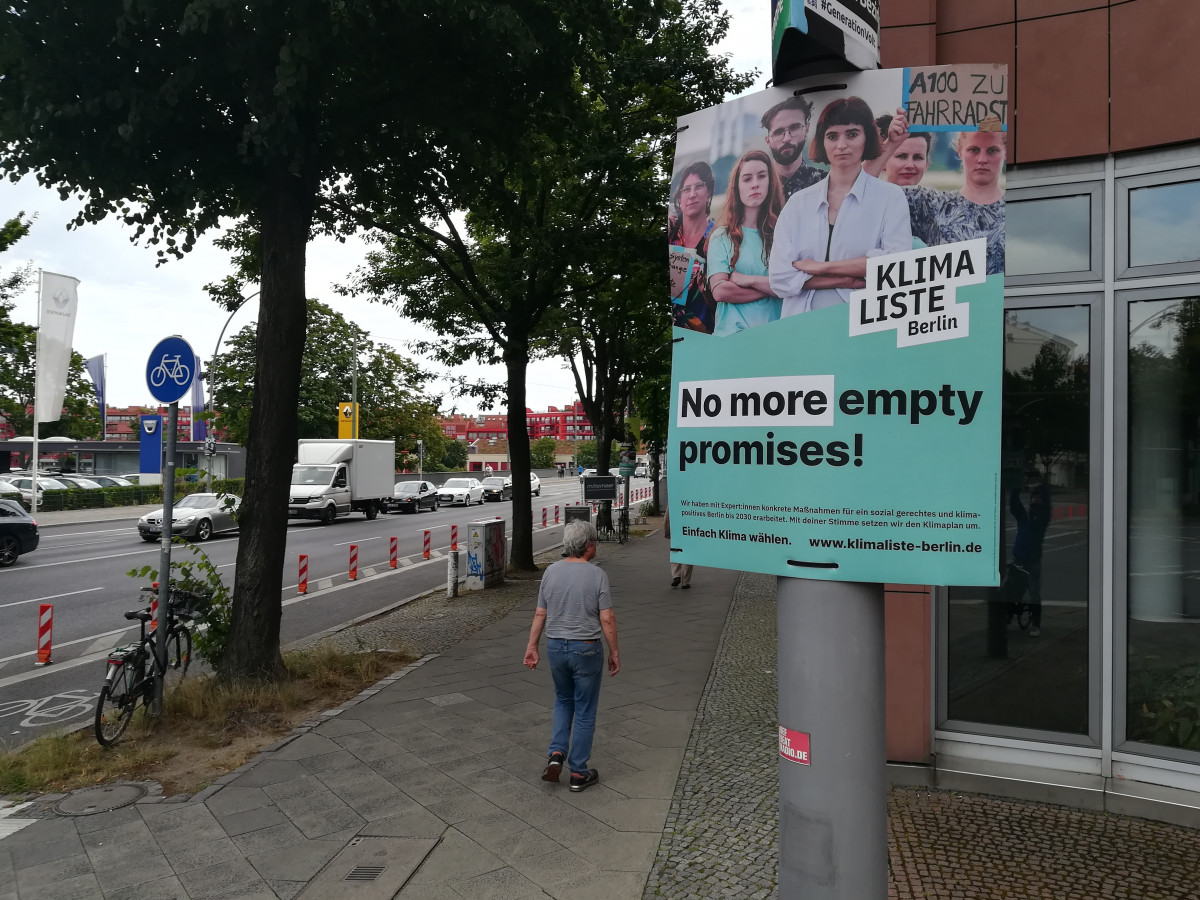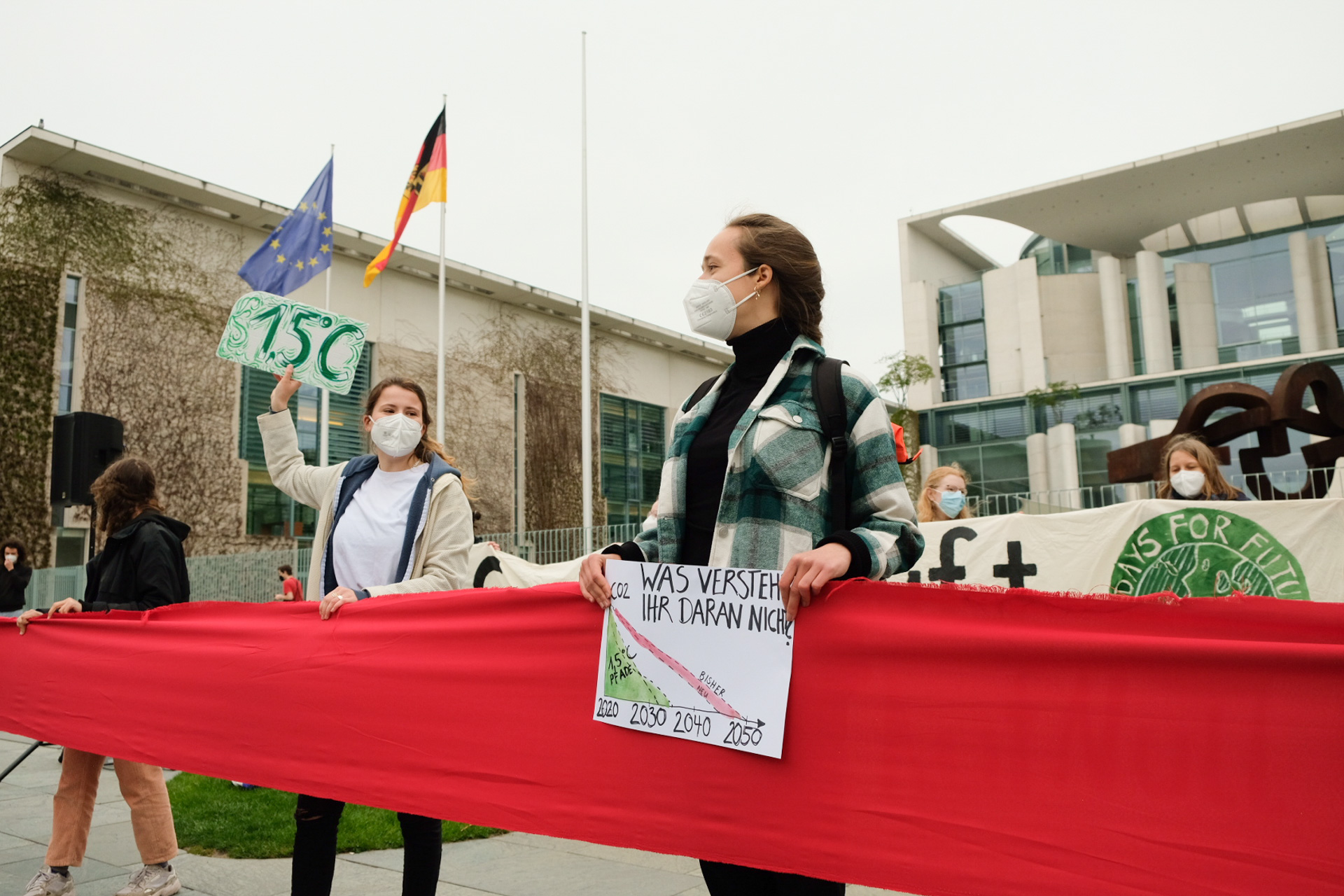German election primer – Climate activists push parties to commit to 1.5°C
What has been the influence of the climate movement on German policy?
- The youth climate movement, following the example of Swedish schoolgirl Greta Thunberg, inspired thousands of people – mostly students and pupils - to protest for more climate action in recent years. In 2019, as many as 1.4 million people took to the streets in Germany for a climate strike. Since then, the climate movement has been an indispensable part of the public debate; and activists - most notably Fridays for Future’s frontwoman Luisa Neubauer - are regularly invited to speak on national talkshows or in other media.
- After the school strikes began to pick up pace in March 2019, Chancellor Angela Merkel said she “strongly welcomed” the movement and credited the school strikers for pushing the government to act more resolutely on its 2030 climate package. Economy minister Peter Altmaier (CDU) later said that he “welcomed” the Fridays for Future protests in an interview with public broadcaster Dlf. "Global warming doesn't take a break," he said in a message on Twitter, adding that "we can and must become better – a climate neutral, economically powerful and social Europe must be the target across parties."
- In April 2021, Germany's highest court ruled that the government's climate regulation was insufficient, as it lacked detail on emission reduction targets beyond 2030 and would therefore put the largest burden on today's young people. The case was started by climate activists from Fridays for Future, who said the ruling was a timely decision ahead of Germany's federal election. "It gives us everything we need for this year, for this federal election campaign, and for our future work as a movement,” said Neubauer. Following the case, the German government under Chancellor Merkel pulled forward its net-zero target by five years to 2045, and raised the country's emissions reduction targets for 2030 to 65 percent (previously 55%) and 2040 to 88 percent (previously no target).
How do activists push for more climate action ahead of the election?
- Despite ongoing restrictions imposed by the pandemic response, activists have recently taken to the streets again for larger protests. In August, Fridays for Future got 15.000 people out in Frankfurt for a demonstration targeting the financial sector. Shortly after, Extinction Rebellion and about 50 other activist groups joined forces for a week of protest in Berlin to call for more climate action six weeks ahead of the federal election. Meanwhile, activists from Ende Gelände blocked a natural gas terminal in the north of the country.
- Several climate activists have chosen to run for parliament during the German election year. The 20-year-old Jakob Blasel, for example, who was one of the frontrunners of the Fridays for Future movement, is running on a Green party ticket because he wants to “close the gap between activism and actual decision-making processes”, he told Clean Energy Wire.
- The activist group Klimaliste has recently founded its own national political party with the aim to steer German politics to a clear commitment to the 1.5°C global warming limit outlined in the Paris Agreement. Though Klimaliste refrains from running on a national level due to time constraints for the new party, it will participate in the state elections in Berlin that take place on the same day. The Klimaliste is seen as a direct competitor of the Green Party, which some climate activists have criticised for adopting a too moderate tone regarding climate action in a bid to lure voters away from more conservative-leaning parties. While the Klimaliste has managed to gain seats in elections at the municipal level, the activist group so far has participated in three state elections and failed to clear the five-percent threshold to enter parliament in either one of them.

What are the main demands of the climate movement?
- Climate action groups in Germany call for policy that is in line with the goal of limiting global warming to 1.5°C, the lower boundary of the global warming limit outlined in the Paris Agreement of 2015.
- The climate movement wants to see a full transition to clean energy as quickly as possible. Fridays for Future calls for net-zero emissions by 2035, while Extinction Rebellion wants this goal to be reached by 2025. This implies an earlier coal-exit date – which is currently 2038 and should be 2030 or even earlier, according to different activist groups – and a much faster roll-out of renewable energy. Activists also oppose the gas pipeline project Nord Stream 2, saying that natural gas cannot be used as a ‘bridge technology’ on the way to climate neutrality.
- Many climate activists call for a ‘just transition’ that goes beyond a technical transition to clean energy alone. During demonstrations and online, activists combine the call for more climate action with calls of anti-racism, anti-capitalism and other social and economic questions. Fridays for Future has started an ongoing collaboration with the service worker’s trade union Ver.di and anti-racism group Unteilbar (‘indivisible’) to combine the interests of the different groups and call for an energy transition that ‘leaves no one behind’.
- Some climate activist groups, such as Extinction Rebellion, call for the installment of a citizen’s council on the climate. This political instrument allows citizens to come up with solutions to the climate crisis and give policy recommendations – binding or not – to the parliament. “It’s time to kick the lobby groups out of the parliament and give citizens a chance to really participate in democracy,” Extinction Rebellion said.
Youth climate movement drives public debate about policy
English
Climate protests and their policy impact
16 Aug 2023, 11:11
How climate activists take on the German super election year
English
12 Mar 2021, 14:30
Vote21 - German elections set the scene for key decade of energy transition
English
Climate and COVID define campaigns as Merkel's era comes to an end
27 Sep 2021, 15:00
All texts created by the Clean Energy Wire are available under a “Creative Commons Attribution 4.0 International Licence (CC BY 4.0)”. They can be copied, shared and made publicly accessible by users so long as they give appropriate credit, provide a link to the license, and indicate if changes were made.

